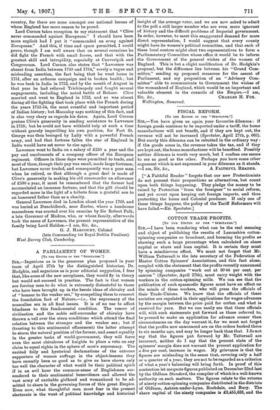A PARLIAMENT OF WOMEN.
[To Fag Boma or Tas .arzoisTols."[ Sra,—Ingenious as is the generous plan proposed in your issue of April 27th by the distinguished historian, Dr. Hodgkin, and sagacious as is your editorial suggestion, I fear that, like some of the new aeroplanes, they would fly in theory but would not succeed in practice. The fact is that women are forcing men to do what is extremely distasteful to those who have been brought up in the heroic ideas of chivalry and of " honour to the weaker sex," by compelling them to reassert the foundation fact of Nature,—i.e., the supremacy of the masculine sex in all final issues. It is of no use to affect blindness to this fundamental condition. The veneer of civilisation and the noble self-surrender of chivalry have thrown a veil over the stern conditions which attend the final relation between the stronger and the weaker sex ; but if (trusting to this sentimental effacement) the latter attempt to storm the natural position of the former, and assert equality in the greater tasks of world-government, they will force even the most chivalrous of knights to place a veto on any claim to equal rights in the sphere of man's supremacy. The excited folly and hysterical declamations of the extreme supporters of woman suffrage in the object-lessons they have recently been so good as to give us have shown only too well the character of what would be their political spirit if in an evil hour the common-sense of Englishmen sur- rendered to their sentimental benevolence and allowed the vast army of excitable girlhood and womanhood to be ad- mitted to share in the governing forces of this great Empire. Even now, what thoughtful men most fear in the present electorate is the want of political knowledge and historical insight of the average voter, and we are now asked to admit to the poll a still larger number who are even more ignorant of history and the difficult problems of Imperial government. In order, however, to meet this exaggerated demand for more direct representation, I would suggest that every county might have its women's political committee, and that each of these local centres might elect two representatives to form a Parliamentary Committee whose office it would be to inform the Government of the general wishes of the women of England. This is but a slight modification of Dr. Hodgkins proposal, but the difference lies between his "Grand Com- mittee," sending up proposed measures for the assent of Parliament, and my proposition of an "Advisory Com- mittee" able to communicate to Government the wishes of the womanhood of England, which would be an important and valuable element in the councils of the Empire.—I am,














































 Previous page
Previous page